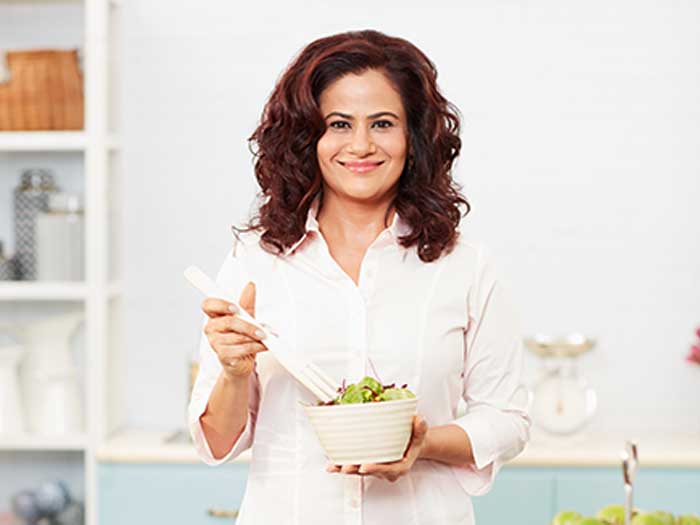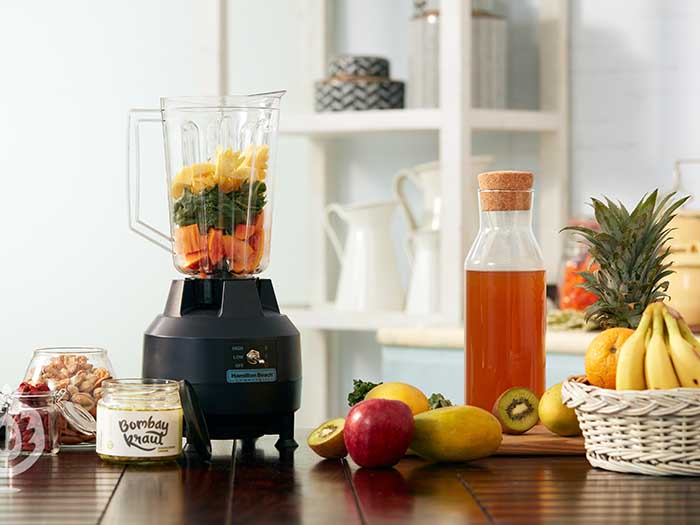In Conversation with Shonali Sabherwal, Macrobiotic Nutritionist & Chef
Shonali Sabherwal is India’s best-known Macrobiotic nutritionist and she has been a driving force in the nutrition world educating people to use food to heal their bodies. When her father was diagnosed with prostate cancer 20 years ago, she began seeking out alternative healing methods and chanced upon macrobiotics. Shonali has trained at the Kushi Institute in Massachusetts, US and started her macrobiotic meal business in 2007. Her clientele includes the rich and the famous – Bollywood celebrities like Hema Malini, Katrina Kaif, Sidharth Malhotra, Neha Dhupia, Jacqueline Fernandez, Zoya Akhtar, Javed Akhtar, Esha Deol swear by her diets. Shonali has also written three books The Beauty Diet, The Detox Diet and The Love Diet. She has worked with ailments (over 1000 different cases) and helped reverse or keep them in remission. Her core specialization is in the field of cancer and irritable bowel disorders.

Shonali Sabherwal, India’s best-known Macrobiotic nutritionist. Photo Credit: Shutterstock
Organic Facts caught up with Shonali Sabherwal and began by asking her about the numerous benefits of adopting the macrobiotic diet. [1]
OF: You have said that your mission is to create a market for the macrobiotic diet lifestyle & an alternate approach using food to heal the body. What are the main reasons that you think people should adopt the macrobiotic diet?
SS: A macrobiotic diet can cure practically all ailments under the sun. It goes a step further than other diets like the high-protein diet because macrobiotics addresses the energy or the macro-nutrients of the foods. The macrobiotic diet has its roots in traditional Japanese food (lineage to Okinawa diet) which claimed to boost longevity and emphasizes whole grains, legumes, and vegetables and recommends having some fruits and the occasional fish. Fermented foods are the cornerstone of the macrobiotic diet, to build a strong gut microbiome and provide good gut bacteria.
Whole grains like foxtail millet, sorghum (jowar in India), and brown rice are excellent additions to a daily diet. Try and have it whole instead of getting it milled.
The macrobiotic diet has the ability to keep your cellular structure detoxified at all times and this helps to reverse age, keeps you youthful, and can even help cure cancer.
OF: In a macrobiotic diet, fish and fruit are recommended occasionally. Since this goes against conventional diet rules, can you share with us the reasons for this?
SS: It depends on the local conditions. If you are in a tropical country like India, you can have 2-3 servings a day. But people overdose on fruits by having 1 kilo of fruits every day and this can cause a fructose overload.
It depends on your activity level and goals. If you are a physically active person and you cannot do without your chicken or meat, then I will recommend that you have a lot of greens to complement it. It’s a way of balancing yin and yang – the yin of greens to the yang of meats. If the meats increase the heat or pitta (heat in Ayurvedic terms), then greens help to cool down the body.
OF: You talked about fermented foods a decade ago. And now, fermented foods like kombucha are trending as superfoods.
SS:
Fermented foods is one of the most important components of the macrobiotic diet. Today, more than 80 percent of my clients come with compromised digestive systems. More than ever, we need to have foods which contain gut-healthy bacteria.
The Japanese incorporated miso pastes into their soups and dishes. But it is difficult to put it in daily cooking. For example, people do not like to have soups in warm regions. So I always look to tailor-make diets suited to the person and the country they are living in. Indians like to have dal (legumes) and so I recommend adding miso paste to those kinds of dishes.

Cooking or preparing juice at home ensures quality. Photo Credit: Shonali
You can easily make your own pickles at home. Instead of opting for pickles drenched in refined oil and table salt, you can make an instant pickle by grating vegetables and add rock or sea salt to it. Or you can make a sauerkraut (German) version by fermenting grated vegetables in salt for seven days.
Kanji, a traditional fermented drink from North India or kefir are wonderful additions to the diet. Yogurt, as it is had today, is not as beneficial as the commercial versions have bacteria in its mutated form. Home-made or organic yogurt with better quality dairy (cows which are grass-fed, not given growth hormones) is a better option.
OF: As a changemaker in the nutrition space, what are the changes that you are most proud of that you have made?
SS: I am most proud of the media work which I have done, whether it is the questions I have answered in national dailies in India or the books that I have written. Through my writings, I have been able to reach people in smaller towns.
The objective is to spread the word on holistic health and nutrition and I believe that if people can even take away 20 percent of what I have said and incorporate it to lead a healthier lifestyle, I am happy.
I have also closely worked with certain schools like Eco Mondiale World School. We have helped change the way children eat – they are now eating brown rice and 80 percent of the foods offered to them are sugar-free. For the younger children, we offer milkshakes made with mashed brown rice and this has helped them improve their bowel movements. Working and educating children has been a rewarding experience and I would love to work with more schools on nutrition education.
